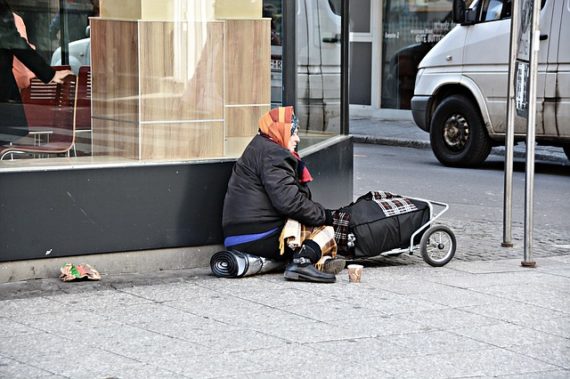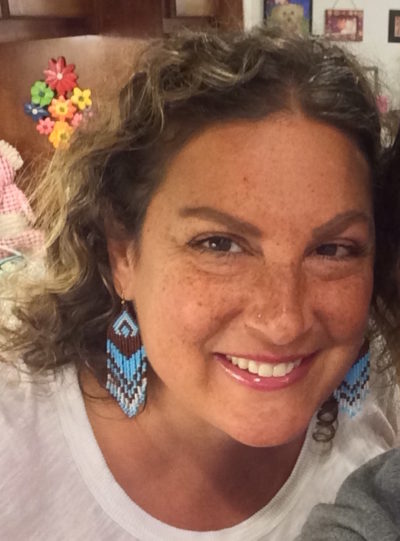
Image of random homeless woman by Wolfgang van de Rydt from Pixabay
(6-11-21) This is the third and last in a series of guest blogs written by Los Angeles Skid Row doctor Susan Partovi about Patty. As with all guest blogs, the opinions expressed are those of the writer. Please post your thoughts on my facebook page. What do you think about Dr. Partovi’s actions?
“Treatment First, Housing Second”
By Susan Partovi, M.D.
I hadn’t seen Patty for several weeks. I had made a very difficult decision. If she came to me for help, I would only put her into a hotel if she agreed to begin taking a long acting injection version of the antipsychotic she had been trying to take orally. I struggled with this decision.
Am I manipulating her into taking her medications? Am I using a human rights need as a carrot in order to persuade her into taking her medications?
No.
The only way she could stay in a hotel without destroying it or getting kicked out was for her to be mentally stable. Otherwise we would just be wasting our grant money. Yes, she was safe when she was in a hotel, but her behavior was so unpredictable that she would continue to get kicked out.
It was a very difficult decision.
No Shot. No Hotel.
I told the team at the Center for Harm Reduction, CHR, (aka the needle exchange and my clinic) and at the Refresh Spot, “If you see Patty, let her know that I will put her in another hotel, but only if she agrees to take the shot.”
A couple weeks later I was driving with our outreach team through Skid Row after stopping by CHR to pick up supplies. As we turned onto Towne Ave from 4th Street, I spotted a short, skinny woman pushing a cart full of precious cargo.
“Slow down, that’s Patty!” I said.
The driver rolled down the window.
“Hey Patty!” I called.
“Oh, Hi Dr. Partovi.”
“I’ll get you into a hotel when you take the shot.”
Without hesitation or resistance, she replied: “Ok, Dr. Partovi.”
Hmmm. Was it really going to be that easy?
The next day, Patty came to my office.
“I’m ready for my shot,” she said. “I need to get off the streets.”
“Do you understand that this is the exact same medicine you were taking before from me and at the hospital, but just as a shot version that will last a month?” I asked. “And do you realize that this medicine helps keep your ‘emotions’ stable (that’s how she had worded her condition previously)? This just makes it easier, since you have proven that it’s just too hard to remember to take your pills every day.”
“Yup,” she replied, without argument.
Somehow, Patty had come to terms with my offer and said she was perfectly fine with accepting the shot. I gave it to her. That same day I texted the hotel manager where Patty had completely destroyed her room.
“Can I put Patty in your hotel in downtown?” I asked.
I explained that I had just given her a long acting injectable that would keep her calm. “I promise she will behave.”
Silence. I anxiously watched for a reply text. And waited for what seemed like a long time.
“Yes.”
Part of me couldn’t believe he was giving her/us another chance. I called the person in charge of our Skid Row grant so we could pay for her hotel stay. As we’d done so many times before, Patty and I piled all her things into my car, drove to the corner market for some bread, peanut butter etc…to hold her over during the weekend, and, of course, cigarettes!
I texted a psychiatrist friend. “She took the shot!”
“Congrats!” she replied and then joked, “But also a little weird that you get off on giving shots!”
I called Patty’s former caseworker to arrange an interview so she could help her get housing. And I called the person in charge of our outpatient drug treatment program to get her enrolled into that program. Patty didn’t have a phone, but the hotel manager said he would take messages for her so she would know about her upcoming appointments.
Patty slept a lot. I’d check in with Peter, the hotel manager, who said Patty was behaving and very pleasant.
Thank God!! I whisper to myself.
When it was time for Patty’s monthly shot, I contacted everyone involved in her case so they could remind her to come see me. Would she come? After so many failed attempts at getting her symptoms under control, I was nervous and suspected that she wouldn’t show up.
That Thursday, Patty appeared right on time.
“That dose kind of dulled me, can I get a lower dose?” she asked.
I texted my psychiatrist friend for advice about dosage and gave her the injectable.
Bad News – But Not From Patty
I received an email telling me that the grant we were using to pay for the hotel room would run out in two weeks. I told Patty’s caseworker that we would need to find another option.
Patty was wanting help. We couldn’t turn her away now!
Fortunately, her caseworker found Patty a place in South L.A. Getting a Covid test delayed the process and then, one morning, Patti appeared at the clinic pushing a cart (never a good sign).
“I don’t want to stay there,” she said of her new place. “They wouldn’t let me out; they wouldn’t let me smoke. I felt like I was in jail. I’ve worked very hard to stay out of jail. I don’t like being treated like that. And then I would have to share a room. Plus I used to gang bang in that area and it’s not safe.”
I was firm. “You have no other choice; we don’t have any more funds for you for a hotel.”
“I don’t mean any disrespect, Dr. Partovi, and I do appreciate all that you have done for me, but what about The Russ? (a hotel in skid row used for temporary housing called “interim housing.”) She asked me to call them.
“It doesn’t work that way,” I replied.
Patty and I went back and forth with more of the same. Finally, totally frustrated, I said, “Patty, we worked really hard to get you into this place. Please, just go. Put up with ‘feeling like you are in jail’ for just a little bit. Your choice is either this place or the streets.”
Now, completely stable and thinking clearly, Patty chose the streets.
Respect and Acceptance
I’m not sure exactly what the issue really was at the housing we offered, but I believe there is something to be said about treating vulnerable people with respect and acceptance. I think that is a basic need we all have.
Right on schedule, Patty showed up for her shot.
“Dr. Partovi, I want you to know that I’ve been looking around to find a place. I need a letter from you and then I have to go to the Department of Mental Health. They are going to get me a place.”
She was proud of herself for taking matters into her own hands and so was I. She asked me to lower her dose, which I did. She agreed to the flu shot and another Covid test. It was like Christmas.
The next week, one of our workers put her in a hotel that was a quarantine site for those experiencing homelessness and exposed to Covid or had symptoms. She called me from the hotel and giggled, “I’m just watching a lot of TV! And get this Dr. Partovi, they give us shots of vodka! I’m getting into (a new hotel) next Monday!”
Well, I thought, that is really meeting people where they are! The county finally figured out that making sure people who needed to stay in quarantine might have needed to get high. They also gave out marijuana. That’s how we keep people safe!
The following week, Patty came into the clinic,
“I’m at the (new hotel). My daughter came over and did my hair! I’m right around the corner from Homeless Health Care and I’m in ITP (our outpatient drug treatment program). I go there Monday, Wednesday and Friday. And, if you’re gonna be on vacation in two weeks, then I should get my shot next week!”
I remembered when I got Patty admitted into a hospital and the Inpatient Psych resident agreed to keep her there longer than 72 hours. “Yeah, we’re going to let her marinate here for a while.” What a great metaphor, I’d thought. People experiencing acute psychosis might calm down in 72 hours (the first “hold”) but really, their brain needs more time to stabilize.
I thought about where Patty was now.
Marinating.
About the Author: Susan Partovi, MD, is Medical Director for Homeless Health Care LA. She completed her undergraduate work in psychobiology at UCLA and earned her medical degree from Thomas Jefferson Medical School in Philadelphia, PA. During her undergrad years she spent her Saturdays working with a Physician’s Assistant attending to squatters living on a dump site in Tijuana Mexico. She completed her residency in Family Medicine at the County Hospital, Harbor-UCLA Medical Center in Los Angeles where she focused on working with the uninsured and the poor. She spent six years on its faculty before moving to a community clinic where she was introduced to Homeless Medicine. That led to her working almost exclusively with the homeless, creating street medicine programs throughout L.A. In 2004 she started working for Homeless Health Care Los Angeles beginning a “career” in wound care and working with homeless heroin users of skid row. She soon became Homeless Health Care Los Angeles’ Medical Director and continues to be part of their innovative creations in best caring for the homeless…especially the mentally ill and drug users.




